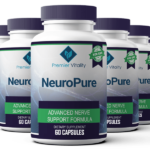Have you ever felt like your feet were asleep, even when you’re wide awake? Or maybe your fingers feel clumsy, like buttons have become miniature Rubik’s Cubes? You might be experiencing neuropathy, the often misunderstood tingling, numbness, or weakness that affects nerves outside the brain and spinal cord.
Imagine your nerves as electrical wires carrying messages between your brain and your body. In neuropathy, those wires get damaged, disrupting the flow of information. This can lead to a range of symptoms, from the mild (pins and needles) to the more serious (muscle weakness, pain, and even burning sensations).
But don’t panic! Neuropathy isn’t a single disease, it’s a symptom of various underlying conditions. It could be your trusty friend diabetes playing tricks, vitamin deficiencies causing a power outage, or even an autoimmune disease taking aim at your nervous system.
The good news?
You’re not alone in this tingling tango. Millions of people around the world experience neuropathy, and the dedicated team of doctors and researchers are constantly seeking better ways to manage it.
While a cure is still in the works, there are plenty of ways to keep your nerves happy and dancing. From lifestyle changes like healthy eating and exercise, to targeted therapies like medications and physical therapy, you can regain control and minimize the impact of neuropathy.
So, next time your toes decide to play “phantom tap dancing,” remember: it’s not your imagination, it’s neuropathy. But by understanding the root cause and exploring treatment options, you can tap back into a happy, healthy body.
How to relieve the pain?
Relieving neuropathy pain can involve a multi-pronged approach, as there’s no single cure-all. There are some options to consider, but consulting your doctor for personalized advice is very important:
Lifestyle changes: Healthy habits can significantly impact neuropathy pain. Do exercise and improve your eating habits.
Emotional and mental support: Living with chronic pain can be emotionally challenging. Consider joining support groups or seeking counseling to manage stress, anxiety, and depression that can exacerbate pain
Pain management therapies: Your doctor might prescribe medication to relief pain. You can use creams or patches on localized pain. A physical therapist can design exercises and stretches to improve nerve function and mobility or search some alternative therapies like acupuncture or biofeedback, can help it, too.
- Medications: Over-the-counter pain relievers like acetaminophen or ibuprofen may offer initial relief. For more severe pain, your doctor might prescribe controlled medication in rare cases.
- Topical treatments: Some creams or patches can provide localized pain relief. Be sure to follow application instructions carefully to avoid side effects.
- Physical therapy: A physical therapist can design exercises and stretches to improve nerve function and mobility, alleviating pain and preventing further damage.
- Alternative therapies: Acupuncture, massage therapy, and biofeedback might offer some pain relief, but further research is needed to confirm their effectivenes
NeuroPure
In recent years there has been increasing attention paid to studying natural products that can counteract the damaging effects of environmental toxic compounds and/or prevent the development of many human diseases; thus, different types of fruits and vegetables have been evaluated and recognized as valuable sources of nutraceuticals. Using these studies NeuroPure was development to promote healthy nerves by providing 5 vital bio-available fruit, flower and bark extracts with essential vitamin and mineral support. NeuroPure have combined our years of medical and research experience, together with medical studies from top universities, to perfect this formula.

Resource: https://www.ncbi.nlm.nih.gov/pmc/articles/PMC3820065/
